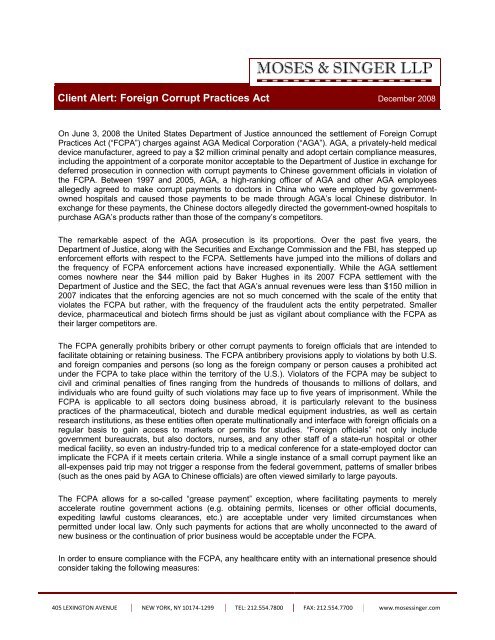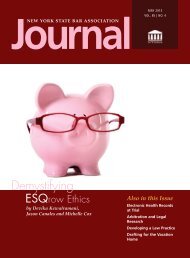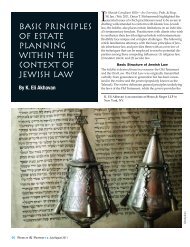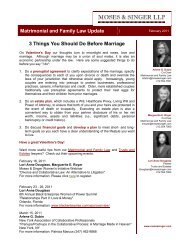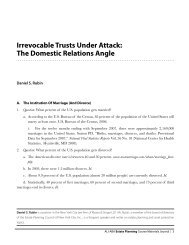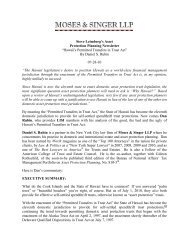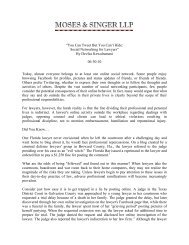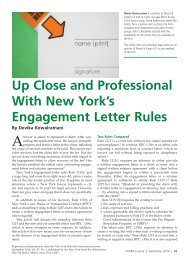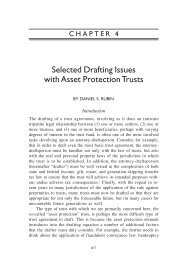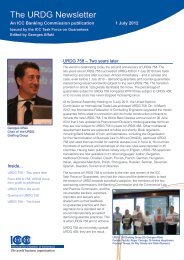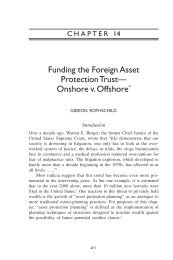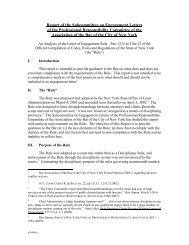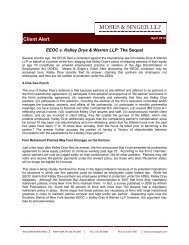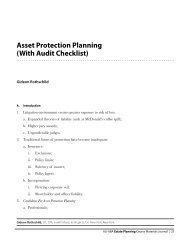Client Alert: Foreign Corrupt Practices Act - Moses & Singer, LLP
Client Alert: Foreign Corrupt Practices Act - Moses & Singer, LLP
Client Alert: Foreign Corrupt Practices Act - Moses & Singer, LLP
Create successful ePaper yourself
Turn your PDF publications into a flip-book with our unique Google optimized e-Paper software.
<strong>Client</strong> <strong>Alert</strong>: <strong>Foreign</strong> <strong>Corrupt</strong> <strong>Practices</strong> <strong>Act</strong> December 2008<br />
On June 3, 2008 the United States Department of Justice announced the settlement of <strong>Foreign</strong> <strong>Corrupt</strong><br />
<strong>Practices</strong> <strong>Act</strong> (“FCPA”) charges against AGA Medical Corporation (“AGA”). AGA, a privately-held medical<br />
device manufacturer, agreed to pay a $2 million criminal penalty and adopt certain compliance measures,<br />
including the appointment of a corporate monitor acceptable to the Department of Justice in exchange for<br />
deferred prosecution in connection with corrupt payments to Chinese government officials in violation of<br />
the FCPA. Between 1997 and 2005, AGA, a high-ranking officer of AGA and other AGA employees<br />
allegedly agreed to make corrupt payments to doctors in China who were employed by governmentowned<br />
hospitals and caused those payments to be made through AGA’s local Chinese distributor. In<br />
exchange for these payments, the Chinese doctors allegedly directed the government-owned hospitals to<br />
purchase AGA’s products rather than those of the company’s competitors.<br />
The remarkable aspect of the AGA prosecution is its proportions. Over the past five years, the<br />
Department of Justice, along with the Securities and Exchange Commission and the FBI, has stepped up<br />
enforcement efforts with respect to the FCPA. Settlements have jumped into the millions of dollars and<br />
the frequency of FCPA enforcement actions have increased exponentially. While the AGA settlement<br />
comes nowhere near the $44 million paid by Baker Hughes in its 2007 FCPA settlement with the<br />
Department of Justice and the SEC, the fact that AGA’s annual revenues were less than $150 million in<br />
2007 indicates that the enforcing agencies are not so much concerned with the scale of the entity that<br />
violates the FCPA but rather, with the frequency of the fraudulent acts the entity perpetrated. Smaller<br />
device, pharmaceutical and biotech firms should be just as vigilant about compliance with the FCPA as<br />
their larger competitors are.<br />
The FCPA generally prohibits bribery or other corrupt payments to foreign officials that are intended to<br />
facilitate obtaining or retaining business. The FCPA antibribery provisions apply to violations by both U.S.<br />
and foreign companies and persons (so long as the foreign company or person causes a prohibited act<br />
under the FCPA to take place within the territory of the U.S.). Violators of the FCPA may be subject to<br />
civil and criminal penalties of fines ranging from the hundreds of thousands to millions of dollars, and<br />
individuals who are found guilty of such violations may face up to five years of imprisonment. While the<br />
FCPA is applicable to all sectors doing business abroad, it is particularly relevant to the business<br />
practices of the pharmaceutical, biotech and durable medical equipment industries, as well as certain<br />
research institutions, as these entities often operate multinationally and interface with foreign officials on a<br />
regular basis to gain access to markets or permits for studies. “<strong>Foreign</strong> officials” not only include<br />
government bureaucrats, but also doctors, nurses, and any other staff of a state-run hospital or other<br />
medical facility, so even an industry-funded trip to a medical conference for a state-employed doctor can<br />
implicate the FCPA if it meets certain criteria. While a single instance of a small corrupt payment like an<br />
all-expenses paid trip may not trigger a response from the federal government, patterns of smaller bribes<br />
(such as the ones paid by AGA to Chinese officials) are often viewed similarly to large payouts.<br />
The FCPA allows for a so-called “grease payment” exception, where facilitating payments to merely<br />
accelerate routine government actions (e.g. obtaining permits, licenses or other official documents,<br />
expediting lawful customs clearances, etc.) are acceptable under very limited circumstances when<br />
permitted under local law. Only such payments for actions that are wholly unconnected to the award of<br />
new business or the continuation of prior business would be acceptable under the FCPA.<br />
In order to ensure compliance with the FCPA, any healthcare entity with an international presence should<br />
consider taking the following measures:<br />
405 LEXINGTON AVENUE NEW YORK, NY 10174-1299 TEL: 212.554.7800 FAX: 212.554.7700 www.mosessinger.com
· Implement a comprehensive policy that addresses what businesses practices are acceptable<br />
or unacceptable in foreign markets. The policy should also address the applicability of the<br />
“grease payment” exception.<br />
· Incorporate detailed written procedures governing, among other things, gifts and hospitality,<br />
meetings, consultant arrangements, charitable contributions, research and other grants with<br />
foreign officials. Such procedures should also define who constitutes a foreign official and<br />
discuss the implications of local anti-corruption regulations alongside an explanation of the<br />
FCPA.<br />
· Institute a periodic audit of internal operations to ensure the entity’s own compliance with the<br />
FCPA and implement annual certification requirements for consultants and service providers<br />
that ensure that third party contractors are also complying with the FCPA.<br />
· Most importantly, entities should train employees both at the entity’s headquarters and in<br />
local jurisdictions in a culturally sensitive fashion so that they fully understand and follow the<br />
mandates of the FCPA.<br />
<strong>Moses</strong> & <strong>Singer</strong> can help entities to determine whether they are affected by the FCPA, and, if so, how<br />
they can best comply with its requirements. We can provide regulatory and compliance advice, drafting of<br />
relevant agreements, as well as assistance in the context of FCPA-related investigations and legal<br />
proceedings.<br />
If you have any questions regarding this <strong>Client</strong> <strong>Alert</strong>, please contact:<br />
Linda A. Malek<br />
(212) 554-7814<br />
lmalek@mosessinger.com<br />
Jill E. Anderson<br />
(212) 554-7836<br />
janderson@mosessinger.com<br />
Cathy J. Frankel<br />
(212) 554-7848<br />
cfrankel@mosessinger.com<br />
Samuel J. Servello<br />
(212) 554-7872<br />
sservello@mosessinger.com<br />
Jay D. Meisel<br />
(212) 554-7823<br />
jmeisel@mosessinger.com<br />
Disclaimer<br />
Viewing this alert or contacting <strong>Moses</strong> & <strong>Singer</strong> <strong>LLP</strong> does not create an attorney-client relationship. This alert is intended as a<br />
general comment on certain recent developments in the law. It does not contain a complete legal analysis or constitute an opinion of<br />
<strong>Moses</strong> & <strong>Singer</strong> <strong>LLP</strong> or any member of the firm on the legal issues herein described. This alert contains timely information that may<br />
eventually be modified or rendered incorrect by future legislative or judicial developments. It is recommended that readers not rely<br />
on this general guide in structuring or analyzing individual transactions or matters but that professional advice be sought in<br />
connection with any such transaction or matter.<br />
To ensure compliance with requirements imposed by the IRS, we inform you that any U.S. tax advice contained in this<br />
communication is not intended or written to be used, and cannot be used, for the purpose of (i) avoiding penalties under the Internal<br />
Revenue Code or (ii) promoting, marketing or recommending to another party any transaction or matter addressed herein.<br />
Attorney Advertising<br />
It is possible that under the laws, rules or regulations of certain jurisdictions, this alert may be construed as an advertisement or<br />
solicitation.<br />
Copyright © 2008 <strong>Moses</strong> & <strong>Singer</strong> <strong>LLP</strong><br />
All Rights Reserved<br />
<strong>Client</strong> <strong>Alert</strong>: <strong>Foreign</strong> <strong>Corrupt</strong> Practice <strong>Act</strong> / December 2008<br />
2


